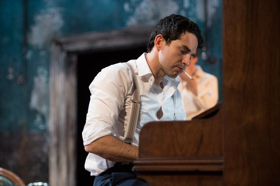Review: THE PICTURE OF DORIAN GRAY, Richmond Theatre

![]() At a time when youth and beauty are valued above all and we can edit our own images at the touch of a button, a staging of Oscar Wilde's novel The Picture of Dorian Gray seems both prescient and timely. A dark and cautionary tale exploring art, aestheticism, ego and narcissism, it seems that Wilde still has much to tell modern society. A new version by Tilted Wig Productions brings Wilde's only novel to life in a touring production that arrives at Richmond Theatre this week.
At a time when youth and beauty are valued above all and we can edit our own images at the touch of a button, a staging of Oscar Wilde's novel The Picture of Dorian Gray seems both prescient and timely. A dark and cautionary tale exploring art, aestheticism, ego and narcissism, it seems that Wilde still has much to tell modern society. A new version by Tilted Wig Productions brings Wilde's only novel to life in a touring production that arrives at Richmond Theatre this week.
We are introduced to Dorian Gray, a young and handsome man, as he has his portrait painted by Basil Hallward. As Gray sits, he talks with Lord Henry Wotton, who persuades him of the value of beauty and pleasure above everything else.
Basil's portrait captivates Gray to such an extent that he wishes to stop ageing and remain forever as beautiful as his portrait. His wish is fulfilled and under the malign influence of his friend Lord Henry, the picture ages and becomes more grotesque, reflecting Gray's descent into moral chaos as he remains youthful.
There are some good performances; Gavin Fowler takes on the role of Gray, starting as gauche and innocent before an almost instantaneous transformation into a sneering and morally corrupt character. He is both convincing and incredibly unlikable.
Jonathan Wrather captures well the disintegration of Lord Henry Wotton into alcoholic despair. He appears to become weighed down by his years of hedonism and immorality. It's a shame that he speaks into the back wall of the set and loses projection at points.
At the time of publication, several reviewers condemned the book for immorality, primarily based on the homosexual undertones. This production concentrates on Basil's unspoken feelings for Gray. Daniel Goode gives a tender performance as Basil; wistfully yearning after him and jealous of Henry's influence over him, but also becoming horrified at what his friend becomes.
Despite Séan Aydon's adaptation turning several male characters from the book into female ones, the women in the production are one dimensional. Phoebe Pryce does best with the role of Lady Victoria Wotton, who delivers her lines with languid calm and poise, but remains very underused.
Wilde's story is dark, witty and sharply observant, yet despite some strong acting, this production does not quite do it justice. A fast-moving first act is followed by a second one that drags in places. The overnight change in Gray's character between acts from innocent young man to sneering and arrogant hedonist not only jars, but also limits any potential for Fowler to show any gradual change.
Aydon's direction lacks necessary gothic horror, with Basil kneeling conveniently on a plastic sheet before being killed by Gray. The hedonistic party scene is also a little clichéd with slow motion movement and flashing lights. Gray's own death also strangely lacks necessary dramatic impact.
Sarah Beaton's design is a romantically derelict looking artist's studio, which serves as multitude of other settings. The tall walls, with worn away paint look impressive to start, but lose effectiveness as there is no variation or set change throughout.
There is much to take away from this production, including a valuable and sobering lesson of not valuing appearances above morality. However, this production needs some sharpening up before it truly matches Wilde's astute and insightful writing.
The Picture of Dorian Grey is at Richmond Theatre until 27 April, then continues touring
Photo Credit: Craig Sugden
Reader Reviews

Videos
